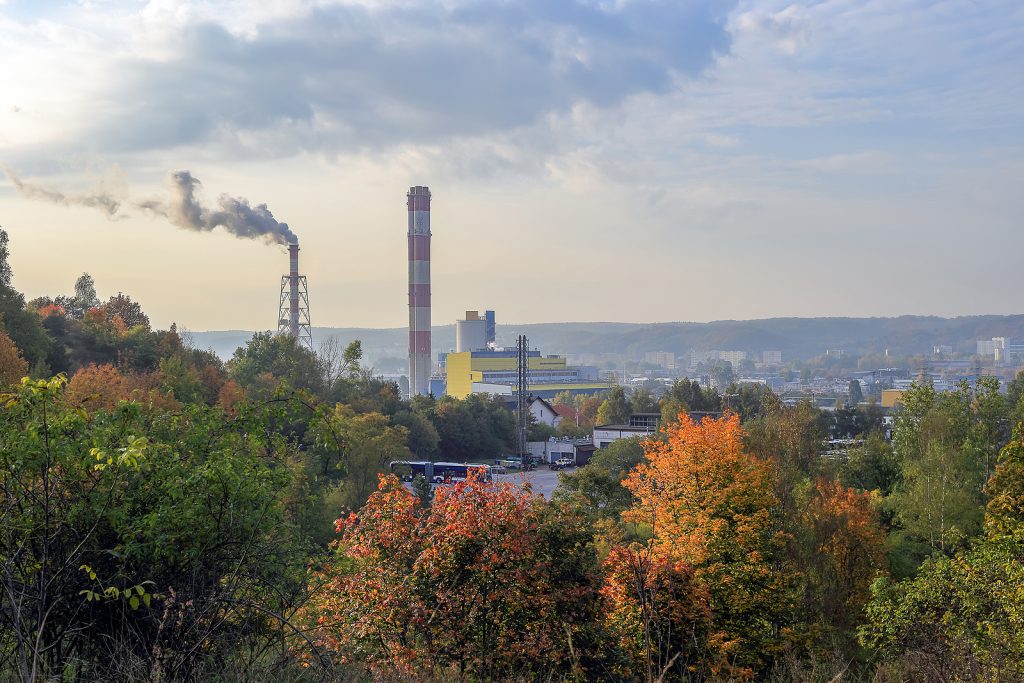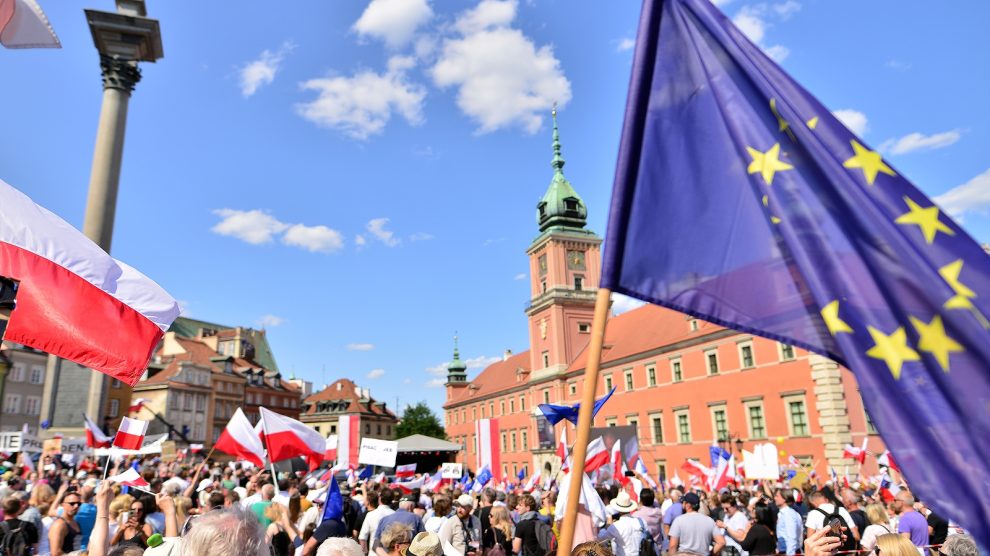From immigration to free laptops for schoolchildren, ahead of an election in October, Poland’s government is happy to talk about anything except the country’s stuttering economy.
Over the past two decades, Poland has become one of the largest economies in the European Union and an emerging Europe powerhouse—largely thanks to its membership of the EU single market.
Indeed, the Polish Economic Institute (PEI), a think tank, estimates Poland’s gross domestic product (GDP) per capita—based on purchasing power parity (PPP)—is currently around 31 per cent higher than if it had not joined the EU.
- For makers of electric vehicles, emerging Europe is increasingly the place to be
- Opportunities abound for Western nuclear firms as CEE shifts away from Russia
- The Last Word: Selling a region to the world
The country has become a regional hub for technology. In the latest edition of the Emerging Europe IT Competitiveness Index, Poland ranked third out of the 23 countries in the region—after only Estonia and Lithuania—and first in the region for talent.
In its latest Front Office CX Omnibus Survey, Ryan Strategic Advisory found Western European customer experience (CX) decision-makers favour Poland as their go-to hub for outsourcers seeking scalable multilingual delivery in Europe’s nearshore.
“There can be little doubt that there are destinations within the European nearshore that have truly stood the test of time, and continue to disrupt CX delivery in their own way,” said Peter Ryan, Ryan Strategic Advisory founder and Principal Analyst. “Poland’s resilience across Western Europe’s boardrooms continues at a steady march.”
Global automotive companies continue to expand their operations in Poland—including Mercedes-Benz, currently building a new factory worth 1.3 billion euros in Jawor, the company’s first plant to exclusively manufacture electric vans.
Polish firms meanwhile continue to expand abroad. State-owned energy giant PKN Orlen operates across much of northern Europe, while brands including CCC, CMYK, and Reserved are a familiar sight on high streets and in malls across Europe.
In energy, while the country continues to refuse to budge on its plans to keep mining coal—which still generates some 70 per cent of Poland’s electricity—until 2049, it has committed to producing 75 per cent of its electricity from alternative sources by 2040.
Currently without a nuclear power station, Poland has of late signed agreements exploring the possibility of constructing both a conventional nuclear power plant and a series of small modular reactors.
Challenges to resilience
Despite its solid foundations, Poland’s economy has endured numerous shocks over the last year and a half as fallout from Russia’s 2022 invasion of Ukraine—notably inflation and a mass influx of Ukrainian refugees.
GDP fell in both the first and second quarters of 2023, 0.3 per cent year-on-year in Q1 and 0.5 per cent in Q2.
The outlook for the Polish economy for the remainder of the year is equally gloomy: it will probably avoid recession, but only just. ING, a bank, last week downgraded its growth forecast for 2023 from an already modest one per cent to just 0.4 per cent.
It is resilience in exports and fixed investment, and a drop in imports, that will likely stave off recession. Poland’s EU-funded National Recovery and Resilience Plan is expected to support public investment, but any further delays in disbursements represent a downside risk, warns the World Bank. The EU is currently withholding 36 billion euros in grants and loans in post-Covid-19 recovery funding, mainly over rule of law concerns.
Inflation peaked in February at 18.4 per cent and had fallen to just under 11 per cent in July. Monetary policy has remained relatively unchanged.
“As it is becoming clear that high inflation cannot be blamed on excessive demand or price-wage spirals, there is fairly little that conventional restrictive monetary and fiscal policies can achieve,” argues Adam Żurawski of Vienna Institute for International Economic Studies (wiiw), a think tank, in his forecast for Poland.
“But further disinflation will undoubtedly follow, as the price and cost effects of the initial negative shocks to the prices of imported energy carriers gradually die out.”

Coal continues to provide around 70 per cent of Poland’s electricity
Migration and politics
Unemployment remains low, and the influx of millions of Ukrainian refugees throughout Poland have provided a much-needed injection into the country’s labour pool. Over 700,000 of the 1.3 million Ukrainian refugees believed to have settled in Poland have registered as regular employees, and the unregistered employment of Ukrainians is likely to also be high.
Żurawski believes the presence of these unregistered employees will reduce the bargaining power of regular employees and keep a lid on wage hikes.
“Wages have generally trailed slightly behind inflation, implying a gentle deterioration in the real incomes of households of wage earners,” adds Żurawski. “Unit labour costs have tended to decline somewhat, as labour productivity has improved. Inflation has served the business sector quite well.”
Ironically, Warsaw stands to gain from a new EU plan to relocate migrants or allocate funds to countries—like Poland—already hosting large populations of refugees and asylum-seekers.
However, Poland’s ruling Law and Justice (PiS) party opposes the deal and has claimed the plan would force it to host more asylum-seekers from Africa and the Middle East, scheduling a referendum to coincide with October’s parliamentary elections in a bid to boost turnout and keep the focus of the campaign away from the economy.
A stuttering economy is never good for a government, so as well as electing a new parliament and delivering their verdict on immigration, Poles will also be asked their opinions on several issues close to the heart of PiS, including the perceived overreach of the European Union.
Handouts and sweeteners
In all there are four questions on the ballot paper: each a ruse, suggest some, to keep the campaign on safe PiS territory and far from the state of the economy.
“Despite high inflation, PiS enjoys popularity – especially among the less prosperous population strata that still relish the various social security transfers made over the past eight years,” suggests Żurawski. “The minor last-minute sweeties that the government could (and probably will) distribute won’t do it (or indeed the public finances) any harm.”
Sweeties there have indeed been. On August 7, one day before announcing that the parliamentary election would be held on October 15, Poland’s President Andrzej Duda approved government proposals to increase a hugely popular monthly child benefit payment from 500 złoty (around 113 euros) to 800 złoty (around 181 euros).
The increase will come into force on January 1 of next year. All families with children under 18, regardless of parental income, are eligible. According to Poland’s Family and Social Policy Minister Marlena Maląg, some seven million children will be able to claim the benefit.
In another handout, all children starting fourth grade this month have been given vouchers worth 2,500 złoty to buy laptops from a list of government-approved vendors.
The handouts may not be enough to secure PiS a clear victory. Current opinion polls suggest that it will need at least one partner to form a government. However, the main opposition alliance, Civic Coalition (KO), has so far run a faltering campaign that has yet to catch public attention.
As has so often been the case in the past, KO has been unable to differentiate itself—economically at least—from PiS. Its leader, Donald Tusk, a former prime minister and president of the European Council, has, however, vowed to “unblock EU funds” on his first day in office.
Whoever wins, the overall course of Poland’s stuttering but broadly successful economic policies seem unlikely to change in the near-term.
Unlike many news and information platforms, Emerging Europe is free to read, and always will be. There is no paywall here. We are independent, not affiliated with nor representing any political party or business organisation. We want the very best for emerging Europe, nothing more, nothing less. Your support will help us continue to spread the word about this amazing region.
You can contribute here. Thank you.







Add Comment